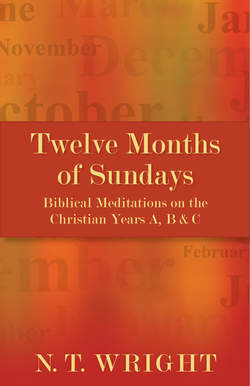Читать книгу Twelve Months of Sundays - N.T. Wright - Страница 28
На сайте Литреса книга снята с продажи.
ОглавлениеThe First Sunday of Lent
Genesis 2.15–17; 3.1–7
Romans 5.12–19
Matthew 4.1–11
Students set to translate Romans 5 often despair: some of its ‘sentences’ have neither subjects nor verbs nor objects, but are just collocations of indirect phrases. Paul at his most oblique: ‘So then – through the trespass of the one – unto all people – unto condemnation, so also – through the righteous act of the one – unto all people – unto the verdict of life!’ Perhaps this too is quite deliberate, the linguistic form that reverence takes when alluding to the deep and strange work of God.
It is also something to do with the fact that this paragraph sums up the previous four and a half chapters and looks on to the next three – and the next three, and the final five. This is the craggy ridge from which, unless you suffer from vertigo, you can look out in both directions – and, indeed, at Genesis 3 and Matthew 4. With a view like that, you don’t expect the path to be gentle.
The point of the Adam/Christ comparison is to emphasize that the human project begun in Genesis, the key part of the creator’s project for the whole creation, has been put back on track. Paul doesn’t offer a full ‘doctrine of sin’ here, but merely summarizes what he had said in 1.18–32 (which doesn’t usually make it into the lectionaries). Enough for the moment to know that sin involves disobedience, failure of loyalty, a fracturing of the creator’s intention, which, because it is a turning away from the source of life, cannot but bring death.
The parallel is unbalanced (that is the point of vv. 15–17) because Jesus did not start where Adam started; he began where Adam ended up. The ‘obedience’ of the Messiah is his obedience to the whole saving plan of God, the Israel-shaped plan to which Israel had herself been disobedient; hence the double task, not just to lift the weight that Adam failed to lift but first to catch it as it fell. And the result of that abounding grace (v. 15) is the firm platform on which Christ’s people now stand. ‘By his knowledge shall the righteous one, my servant, make the many to be accounted righteous, and he shall bear their iniquities’; Isaiah is never far from Paul’s mind, and the echoes here are plain.
Dense doctrinal statements are, of course, shorthand ways of drawing together a larger world of narrative. Romans was written, so far as we know, before the Gospels, but it presupposes the sort of story we find in Matthew 4. Jesus offers God not merely the obedience which Adam refused, but that redeeming obedience which Israel refused in the wilderness. Jesus faced the ‘if …’ of the tempter with courage, with Scripture, with loyalty to the one who had called him. Interestingly, he thereby chose the way Eve had thought to avoid, the way of death, the naked death of the cross. But the tree he chose was the tree of wisdom, the tree of life.
